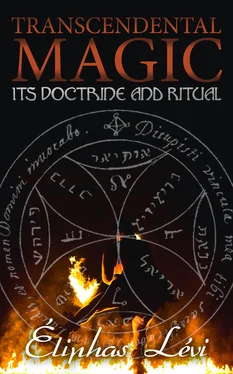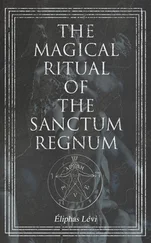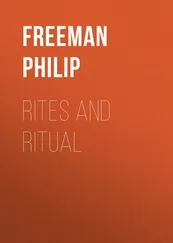After the colossal fable of Oedipus we find the gracious poem of Psyche, which was certainly not invented by Apuleius. The Great Magical Arcanum reappears here under the figure of a mysterious union between a god and a weak mortal, abandoned alone and naked on a rock. Psyche must remain in ignorance of the secret of her ideal royalty, and if she behold her husband she must lose him. Here Apuleius commentates and interprets Moses; but did not the Elohim of Israel and the gods of Apuleius both issue from the sanctuaries of Memphis and Thebes?
Psyche is the sister of Eve, or rather she is Eve spiritualized. Both desire to know and lose innocence for the honour of the ordeal. Both deserve to go down into hell, one to bring back the antique box of Pandora, the other to find and to crush the head of the old serpent, who is the symbol of time and of evil. Both are guilty of the crime which must be expiated by the Prometheus of ancient days and the Lucifer of the Christian legend, the one delivered by Hercules and the other overcome by the Saviour. The Great Magical Secret is therefore the lamp and dagger of Psyche, the apple of Eve, the sacred fire of Prometheus, the burning sceptre of Lucifer, but it is also the Holy Cross of the Redeemer. To be acquainted with it sufficiently for its abuse or divulgation is to deserve all sufferings; to know as one should alone know it, namely, to make use of and conceal it, is to be master of the Absolute.
A single word comprehends all things, and this word consists of four letters: it is the Tetragram of the Hebrews, the AZOT of the alchemists, the Thot of the Bohemians, or the Taro of the Kabalists. This word, expressed after so many manners, means God for the profane, man for the philosophers, and imparts to the adepts the final term of human sciences and the key of divine power; but he only can use it who understands the necessity of never revealing it. Had Oedipus, instead of killing the sphinx, overcome it, harnessed it to his chariot and thus entered Thebes, he would have been king without incest, without misfortunes and without exile. Had Psyche, by meekness and affection, persuaded Love to reveal himself, she would never have lost Love. Now, Love is one of the mythological images of the Great Secret and the Great Agent, because it postulates at once an action and a passion, a void and a plenitude, a shaft and a wound. The initiates will understand me, and on account of the profane I must not speak more clearly.
After the marvellous Golden Ass of Apuleius, we find no more magical epics.
Science, conquered in Alexandria by the fanaticism of the murderers of Hypatia, became Christian, or rather concealed itself under Christian veils with Ammonius, Synesius and the pseudonymous author of the books of Dionysius the Areopagite.
In such times it was necessary to exonerate miracles under the pretence of superstition and science by an unintelligible language. Hieroglyphic writing was revived; pantacles and characters were invented to summarize an entire doctrine by a sign, a whole sequence of tendencies and revelations in a word. What was the end of the aspirants to knowledge? They sought the secret of the Great Work, the Philosophical Stone, the perpetual motion, the quadrature of the circle, the Universal Medicine – formulae which often saved them from persecution and hatred by causing them to be taxed with madness, but all signifying one of the phases of the Great Magical Secret, as we shall show later on. This absence of epics continues till our Romance of the Rose; but the rose-symbol, which expresses also the mysterious and magical sense of Dante's poem, is borrowed from the transcendent Kabalah, and it is time that we should have recourse to this vast and hidden source of universal philosophy.
The Bible, with all its allegories, gives expression to the religious knowledge of the Hebrews only in an incomplete and veiled manner. The book which we have mentioned, the hieratic characters of which we shall explain subsequently, that book which William Postel names the Genesis of Enoch, existed certainly before Moses and the prophets, whose doctrine, fundamentally identical with that of the ancient Egyptians, had also its exotericism and its veils. When Moses spoke to the people, says the sacred book allegorically, he placed a veil over his face, and he removed it when communing with God: this accounts for the alleged Biblical absurdities which so exercised the satirical powers of Voltaire. The books were written only as memorials of tradition and in symbols that were unintelligible to the profane. The Pentateuch and the poems of the prophets were, moreover, elementary works, alike in doctrine, ethics and liturgy; the true secret and traditional philosophy was not committed to writing until a later period and under veils even less transparent. Thus arose a second and unknown Bible, or rather one which was not comprehended by Christians, a storehouse, so they say, of monstrous absurdities – for in this case believers, involved by the same ignorance, speak the language of sceptics – but a monument, as we affirm, which comprises all that philosophical and religious genius has ever accomplished or imagined in the sublime order, a treasure encompassed by thorns, a diamond concealed in a rude and opaque stone: our readers will have guessed already that we refer to the Talmud. How strange is the destiny of the Jews, those scapegoats, martyrs and saviours of the world, a people full of vitality, a bold and hardy race, which persecutions have preserved intact, because it has not yet accomplished its mission! Do not our apostolical traditions declare that after the decline of faith among the Gentiles salvation shall again come forth out of the house of Jacob, and that then the crucified Jew Who is adored by the Christians will give the empire of the world into the hands of God His Father?
On penetrating into the sanctuary of the Kabalah one is seized with admiration in the presence of a doctrine so logical, so simple and at the same time so absolute. The essential union of ideas and signs; the consecration of the most fundamental realities by primitive characters; the trinity of words, letters and numbers; a philosophy simple as the alphabet, profound and infinite as the Word; theorems more complete and luminous than those of Pythagoras; a theology which may be summed up on the fingers; an infinite which can be held in the hollow of an infant's hand; ten figures and twenty-two letters, a triangle, a square and a circle: such are the elements of the Kabalah. Such also are the component principles of the written Word, reflection of that spoken Word which created the world! All truly dogmatic religions have issued from the Kabalah and return therein. Whatsoever is grand or scientific in the religious dreams of the illuminated, of Jacob Bohme, Swedenborg, Saint-Martin and the rest, is borrowed from the Kabalah; all Masonic associations owe to it their secrets and their symbols. The Kabalah alone consecrates the alliance of universal reason and the Divine Word; it establishes by the counterpoise of two forces in apparent opposition, the eternal balance of being; it alone reconciles reason with faith, power with liberty, science with mystery: it has the keys of the present, past and future!
To become initiated into the Kabalah it is insufficient to read and to meditate upon the writings of Reuchlin, Galatinus, Kircher, or Picus de Mirandola; it is necessary to study and understand the Hebrew writers in the collection of Pisto-rius, the Sepher Yetzirah above all; it is essential in particular to master the great book Zohar, to investigate the collection of 1684, entitled Kabbala Denudata , especially the treatise on “Kabalistic Pneumatics” and that on the “Revolution of Souls”; and afterwards to enter boldly into the luminous darkness of the whole dogmatic and allegorical body of the Talmud. We shall be then in a position to understand William Postel, and shall admit secretly that – apart from his very premature and overgenerous dreams about the emancipation of women – this celebrated, learned, illuminated man could not have been so mad as is pretended by those who have not read him.
Читать дальше












